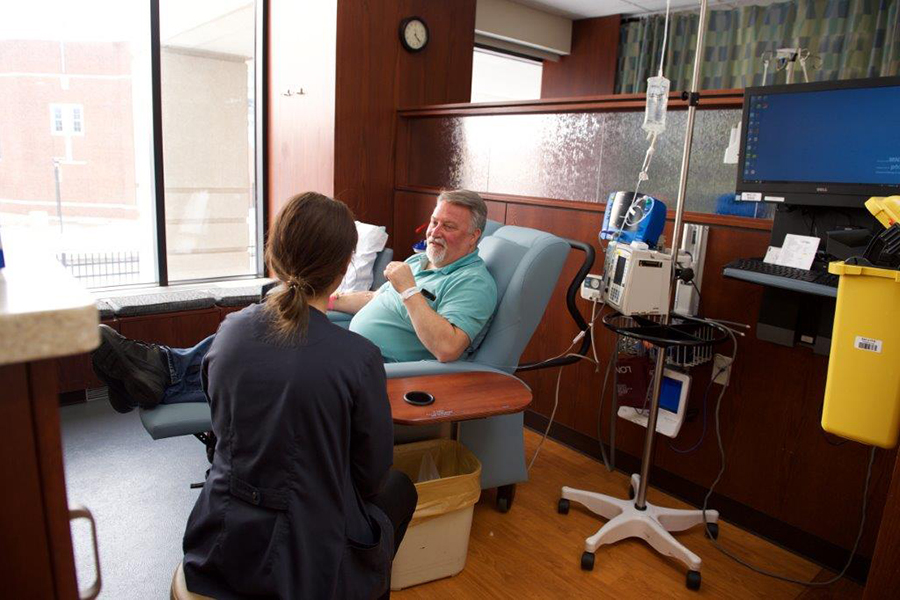When he ran out of options, Kent found the kidney cancer treatment he needed in a clinical trial

Kent Warner’s first symptom of kidney cancer was the blood he noticed in his urine in February 2018.
“It scared the hell out of me,” says Kent, of Cedar Rapids, Iowa. “So I immediately went to my local doctor.”
Scans revealed stage 4 kidney cancer. Kent’s right kidney had already been consumed, and tumors had spread to nearby lymph nodes and into his lungs.
After his diagnosis, Kent took decisive action. He searched for the best cancer care he could find. An initial surgery to remove most of the cancer was successful, but Kent still needed a nonsurgical treatment for the tumors in his lungs.
That led him to medical oncologist Yousef Zakharia, MD, an expert in genitourinary cancers at University of Iowa Holden Comprehensive Cancer Center. Zakharia was conducting a clinical trial of a new therapy for advanced kidney cancer. Kent enrolled in the trial and began receiving treatment.
The new therapy worked, shrinking the tumors that had spread to Kent’s lungs and giving him the kind of hope that every cancer patient seeks.
“Two and a half years after diagnosis and I’m still here,” Kent says. “I’m doing pretty well.”
A grim diagnosis
A software engineer who looks forward to riding RAGBRAI each summer, Kent experienced the same sudden shock that hits many newly diagnosed kidney cancer patients.
“In 24 hours, I went from being a fairly healthy cyclist—or so I thought—to having a very grim cancer diagnosis,” he says.
That’s because kidney cancer can be difficult to detect in its early stages. By the time symptoms show up, the cancer has often advanced to a life-threatening level of severity.
Kent had his right kidney and surrounding lymph nodes removed. But even after that successful procedure, the tumors that had spread to his lungs remained. Those could not be removed with surgery.
Clinical trial offers new hope
Zakharia’s clinical trial of a new immunotherapy for kidney cancer offered a possible treatment for the tumors in Kent’s lungs. Immunotherapy is a type of cancer treatment that trains the body’s own immune cells to recognize and kill cancer cells.
A clinical trial is a test of a new treatment before the treatment is available on the market. For many patients, a clinical trial can offer a new, extra treatment option for a cancer that previously appeared to be untreatable.
“The immunotherapy was extremely effective in eliminating cancer from my lungs,” Kent says. “It was absolutely remarkable.”
Zakharia says UI Hospitals & Clinics and Holden Comprehensive Cancer Center offer Iowans the kind of world-class cancer care and research into the latest therapies that patients like Kent need, close to home.
“We are on the cutting edge of science,” Zakharia says. “As the only academic medical center in Iowa, we offer patients new treatment options to fight their cancer through clinical trials and new medications.”
And Zakharia worked directly with Kent’s local provider so that he could receive his subsequent standard care in Cedar Rapids. Every three months he drives to Iowa City for checkups and follow-up care to monitor his condition. If his disease were to get worse, he would have access to further clinical trials.
“For me, this collaboration with my local doctor has been a lifesaver,” Kent says.
Promising outcomes, with help from a team of cancer specialists
Another advantage Holden offers is a team approach to treating every type of cancer. When Kent developed brain tumors—a common occurrence for kidney cancer patients—he didn’t need to find a new specialist. He already had a radiation oncologist on his care team who could offer him the treatment he needed.
“I started having body aches and headaches like I never had in my life,” Kent says. “At first, I didn’t think there was much they could do. But actually, they did a great deal.”
Holden radiation oncologist Mark Smith, MD, performed stereotactic radiation, a precise technique that targets only the tumors, with minimal damage to surrounding tissue.
While Kent understands the unpredictability of cancer, he remains grateful for the comprehensive care that keeps him looking forward to life after cancer.
A recent scan showed no evidence of disease in his body. Now he’s focusing on regaining his strength through walking, and he hopes to hit the bike path and return to cycling someday.
“I’ve been exceedingly fortunate with my quality of care,” Kent says. “I don’t know what’s in my future, but I’m feeling pretty good now. I’ll take it.”
Learn more about clinical trials at Holden Comprehensive Cancer Center.
